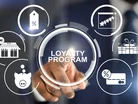How to turn grudge purchases into rewarding experiences

Some purchases, such as insurance, healthcare, or other mandatory expenses, can feel like a necessary evil. We know we have to buy them, but they're not exactly the most exciting or satisfying things to spend our hard-earned money on. But what if there was a way to turn frustrating expenses into valuable experiences?
Making necessary expenses feel more worthwhile
Rewards programs are becoming increasingly popular as a way to incentivise customers. And while rewards like discounts or perks may seem small, they can actually have a big impact on how customers view a purchase - particularly the ones they’re not so enthusiastic about.
Take the example of financial services. Many banks and credit card providers offer perks like cashback to customers that use their products and services. Such rewards provide tangible value, turning a necessary expense like paying bills into an opportunity to earn something back.
Financial Services Rewards program example: Wesleyan
Wesleyan Assurance Society is a company that helps professionals like doctors, dentists, teachers, and lawyers with their finances. It wanted to increase customer engagement and retention by giving their customers more value from their memberships. It created the Wesleyan Wallet cashback scheme, which enables customers to earn cashback at selected retailers using card-linking and affiliate links. The project involved a branded mobile loyalty app called Wesleyan Wallet. In the app, users are prompted to connect their card and use affiliate links to earn cashback as they spend in partner retailers. They can then use the cashback to make ‘free’ purchases.
This was supported by a rewards microsite - an embedded solution that offers enhanced rewards for high-value clients. Customers choose a retail voucher each year to get some of the money spent on their membership back, making Wesleyan’s service more valuable than competitors.
Potential for the insurance industry
Rewards are a great opportunity for insurance companies, too. When insurance providers offer incentives, customers get to turn a potentially unpleasant expense (such as life insurance) into an opportunity to save money or enjoy additional benefits. Take, for example, an individual searching for a new home insurance policy. They know they need it, but the thought of shopping around and paying for it is not the most exciting. However, if they were to find an insurance provider that offers rewards when at the point of purchase, that can completely change the buying experience.
Imagine being able to earn points or perks every time you make a payment on your insurance policy. These points can then be redeemed for things like discounts on future purchases, or even experiences such as travel or entertainment. Suddenly, the act of taking out insurance becomes less of a chore and more of an opportunity to get something back, whilst reducing the cost.
The Vitality Health reward scheme is a great example. To get its customers on board it has created a rich reward program that promotes healthy lifestyle decisions and is based on behavioral economics.
Membership rewards
Some people who have professional qualifications must pay to hold them. For example, solicitors, accountants, bankers, financial actuaries, and HR professionals, often have to pay an annual membership fee. This is often seen as a begrudging and unnecessary purchase (“why do I have to pay a fee to be professionally recognised - I already have the qualifications and experience?!”). As a result of this, many professional bodies have started partnering with rewards providers to offer professionals more value from their memberships.
For instance, an auditor can get access to indemnity insurance at a discount by going through a professional association. This is just one of the ways that professional bodies can give members something back in exchange for their money and loyalty.
Becoming the brand of choice
Rewards programs also provide a point of differentiation when it comes to assessing the value of choosing one company over the other. When comparing two different insurance policies, which both offer similar packages and prices but one of them provides a rewards program with additional benefits, the company that offers rewards is more likely to be the choice - as it offers something the other company does not. It’s a no-brainer.
But rewards programs aren’t just limited to the insurance and financial services industries. They can be found in all sorts of industries, from utilities to FMCG to retail. In all cases, the brands that offer rewards give customers an extra layer of value from their purchases.
About the author: Achille Traore is the CEO, White Label Loyalty. He specialises in Digital Innovation, Customer Engagement, Digital Strategy, Loyalty and retention, Self service solutions, Advertising, Strategic Partnerships, Management, Business Development and more.
Featured Articles
New insurance facility offers up to €1bn coverage for large-scale data centre projects across UK and Europe as demand for digital infrastructure soars
Mphasis teams with Sixfold to accelerate policy processing and boost premium generation per underwriter
Insurance premium finance provider PremFina targets £1.9bn (US$2.58bn) volumes with backing from HSBC and Waterfall Asset Management




